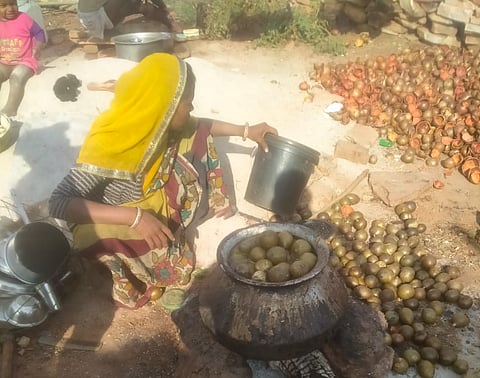
Sheopur/Shivpuri – For centuries, the Sahariya tribe lived in harmony with the forests of Madhya Pradesh, relying on nature for food, medicine, and livelihood. But as climate change accelerates and deforestation worsens, their way of life is vanishing—along with the forests they once called home.
The districts of Sheopur and Shivpuri, once rich in medicinal plants like Safed Musli, Guggul, and Kalihari, are now witnessing a sharp decline in biodiversity. Rising temperatures, erratic rainfall, and deforestation have pushed these species to the brink of extinction, leaving the Sahariyas without their primary source of income and cultural identity.
"I've seen the forest change before my eyes," says Veerendra Parashar, a social worker who has worked with the Sahariya tribe in Sheopur’s Karahal block since 1995. "The medicinal plants that generations of Sahariyas identified and used for healing and selling are vanishing. These herbs were once the backbone of their economy and identity."
With forests shrinking, the Sahariyas now face increasing dangers while gathering herbs. Wild animals like tigers and leopards, displaced by deforestation, pose new threats.
"It has become very difficult to collect herbs now," says Laakhan Adivasi from Upri Khohree village. "We move in groups, but we still risk our lives. Even after all this effort, middlemen pay us very little and sell the products at high prices."
Kishan Adivasi, another villager, adds, "The quantity of herbs has declined so much that our work no longer sustains us. The younger generation is losing interest because it doesn’t guarantee a livelihood. People are migrating to cities in search of work."
The Sahariyas, once self-reliant, are now being displaced as their forests turn into wastelands. Without traditional skills or education, they struggle to adapt in urban areas, often falling prey to exploitation.
Raj Kumar, a member of Sahariya Kranti, an advocacy group, shares their plight: "Our people live worse than animals. We have lost our lands and forests. Contractors take advantage of our illiteracy, paying us extremely low wages."
He also highlights systemic neglect: "Many don’t know about government welfare schemes. Those who try to access them face corruption. Poverty, malnutrition, and lack of education trap us in a cycle we cannot break."
Despite being classified as a Particularly Vulnerable Tribal Group (PVTG), the Sahariyas remain marginalized in policy decisions.
"The government has announced forest conservation programs, but they rarely involve the communities that have protected these forests for centuries," says Parashar. "If we want to restore the forests, we must include the Sahariyas, not displace them."
Dr. Vipin Vyas, a renowned Environmentalist and Professor in the Department of Environmental Science at Barkatullah University, warns that climate change is quietly transforming our forests in alarming ways — posing serious threats not only to biodiversity but also to forest-dependent communities like the Sahariya tribe.
"The physiology and phenology of trees — meaning their natural life processes like flowering, fruiting, or leaf-shedding — are changing due to the rising temperatures and unpredictable climate," he explains. "These seasonal rhythms are no longer in sync. Trees are blooming too early, or not at all, and if this continues, many forest species could begin to vanish." He further points out an invisible but crucial link — pollination. "Many plants rely on specific insects for pollination. But due to climate change, these insects are under threat. If they disappear, the trees will stop reproducing. This will severely affect forest regeneration." One of the most visible signs, he says, is the changing rainfall pattern. "Unseasonal rains or long dry spells are becoming more frequent. The forest doesn't get the water it needs when it needs it. These irregular patterns disturb the entire ecosystem." "He explains that if these changes continue, we may slowly lose the rich life of our forests — from rare medicinal plants and trees to insects and animals — all of which are deeply connected. One loss leads to another, and over time, this delicate balance of nature could begin to fall apart."
"And when humans lose access to natural resources, they begin searching for alternatives — which often means exploiting untouched ecosystems. This, in turn, causes more damage to biodiversity," he adds. This scientific insight reveals a bigger truth — climate change is not just about temperature and rain; it’s about losing balance in an ancient system where every creature, plant, and person is connected. And those who live closest to nature, like the Sahariyas, are the first to suffer its consequences.
As forests degrade, the Sahariyas face an existential crisis—losing not just their livelihood but their identity. Without urgent action, their ancient knowledge and way of life may disappear forever, leaving behind a warning of what happens when nature and its guardians are forgotten.
You can also join our WhatsApp group to get premium and selected news of The Mooknayak on WhatsApp. Click here to join the WhatsApp group.